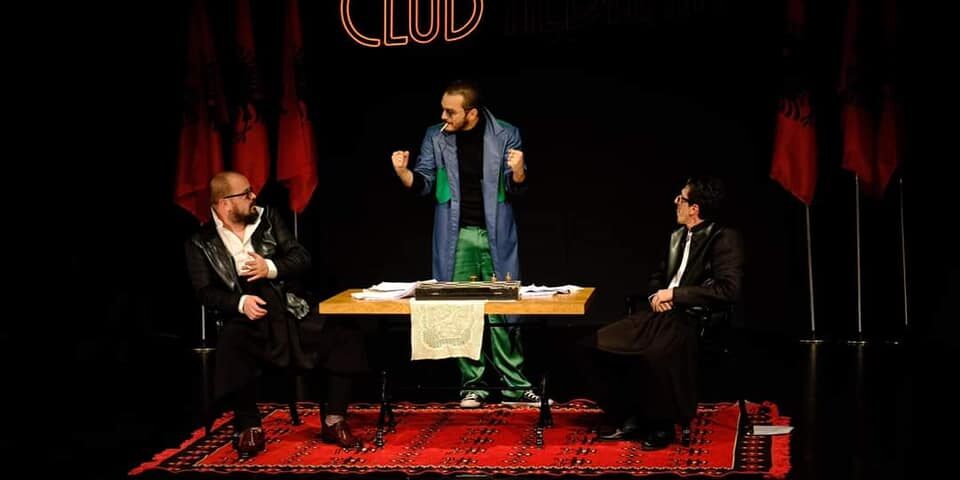National Theatre of Kosovo, Prishtina, premiere 28th November 2022
On the 110th anniversary of Albanian National Flag Day, Club Albania was the first performance to inaugurate the new venue for the National Theatre of Kosovo. The new space at the amphitheatre of Prishtina’s Palace of Youth is a site as old as the National Theatre building itself. Its semi-dark hallways feel intense, but the wood panels and carefully curated photographs of theatre history add a nostalgic atmosphere. The play is based on the political comedy After Death, written around the same time a century ago by Albanian Renaissance author Andon Zako, aka Çajupi. So the timing was also fitting.
As we enter, a man incessantly plays the çifteli. The lights dim and a troupe of actors start to talk feverishly about the upcoming arrival of a new director to direct their next performance. There is a ‘waiting for Godot’ feeling in the air, as the actors wonder whether their next role will be Estragon, Dmitri or Anna. ‘No red flags, please!’ one of them says, alluding to the patriotic undertones that permeate every Flag Day performance. ‘We need something fresh!’ they concur.
One young actor lays out his optimistic philosophy about the future of theatre, in hope that the next play will be a modern one. His slightly older colleague reminds him that nothing really matters in life, as he throws around unfiltered jokes and profanities. The sashaying, statuesque diva is also concerned about the new director: will he cast her in a role worthy of her? As they wonder and worry, a beloved senior actor arrives and manages to raise everyone’s spirits as he announces that the director is on his way. Enter the flamboyant Ylli James and a shy-looking writer hiding behind big glasses and a laptop. The director proudly announces that the new play will be Club Albania, based on Çajupi’s After Death. The title flashes up against the red background sending the troupe into a frenzy. Another old play? What will people say?
The following performance alternates between preparations for the play and behind-the-scenes exchanges, which evolve at an unexpected pace. Rehearsals commence. There are problems with the script and improvisation is encouraged. They address the phonetic complexity of properly rendering the speech of Çajupi’s time in his native south-Albanian dialect (the cast does a brilliant job of this). The eccentric director Ylli James, a proud diaspora Albanian who loves Çajupi, also touches on gender equality and gender identity politics, among other things. The performance includes male actors playing fairies in fishnet stockings and heels, and a tea dress reminiscent of a Lady Gaga-esque dominatrix. ‘Don’t you know Çajupi was a feminist?’ the young actor quips, reminding everyone of Çajupi’s most famous lines: “Burrat nën hije / lozin, kuvendojnë / pika që s’u bie / se nga gratë rrojnë” (translation: “Men lounge in the shade / All day long they shuck and jive / May the Lord all ‘em forsake / For ‘tis women who keep ‘em alive”).
Many things are explored in almost two hours of soliloquy, banter, song and colour – primarily the real-life problems faced by the National Theatre of Kosova over the years. The lack of serious investment in theatre, the failure to establish a proper structure, and the lack of proper institutional appreciation for actors are only a few of the topics discussed. A general sentiment of frustration with the current state of the theatre is evident: art and artists are not sufficiently appreciated. Some hope of better days. Others believe that accolades will come after their death.
‘What will people say after we die?’ This relates directly to Çajupi’s play; after all, its title is After Death. In the original text, the main character is a politician so preoccupied with his image that he becomes fascinated with pre-written obituaries. ‘Beautiful things are said when people die’, he muses. Çajupi’s charlatan politician of over a century ago is not very different from those of today, the play intimates.
Ylber Bardhi gives a vibrant performance with impeccable comedic timing, both physical and psychological. He is famously versatile and there is a chameleon-like quality to his performance as the young actor. Ard Islami is also superb as the elder actor who has become so disappointed that he simply does not care anymore. His nonchalance is relatable because it borders on pragmatism and exhaustion brought on by a system that has taken a toll on his health. ‘I went to the doctor to check my lungs,’ he tells his friend. ‘So I say, how they doin’? Doctor said they’re not there’.
The striking Teuta Krasniqi, well known for her many stage and TV performances, plays the diva, demonstrating that she can handle both comedic and serious roles with flair. Armend Smajli is all charm and vigour as the young director Ylli James. He brings a real zing factor to the character. Naim Berisha, playing the writer who criticizes the ‘modernism inflicted upon our traditional patriotic legacy’, delivers his ridiculously complex jargon perfectly. May-Linda Kosumovic is similarly impressive as the timid writer, deeply committed to her job. Her voice, barely audible at first, builds up across the scenes and eventually stills everyone with her final scream. A ‘social scream’ they call it, a label that resonates on so many levels, beyond the theatre walls and across society.

Club Albania at National Theatre of Kosovo. Photos: Joni Mithi
The phenomenal Armond Morina, a stage and screen star returning to the Kosovo National Theatre after years of absence, is excellent as the seasoned actor who has dedicated his life to theatre. He ponders the meaning of life and art, emulating a two-century-old character, the famous clown Grimaldi. But, as he powders his face. repeating ‘here we are again’, darkness taints his original optimism leading to an unexpected breakdown. ‘Clowns don’t cry’ he sighs… Everyone wears a red clown nose in the end.
Yllka Brada’s costumes are a fitting mix of Ottoman-era attire and contemporary performance-appropriate outfits. British-Kosovar composer Rona Castrioti Berisha brings to the production an eclectic mix of traditional music, quasi-operatic sections and hip-hop. The smooth moves of choreographer Robert Nuha (Noa) are in keeping with the vibe of the play, adding a welcome physicality to the staging.
Shpëtim Selmani – an accomplished poet and actor as well as a playwright – models the play around the 112-year-old “After Death”, melding past and present to form something contemporary and digestible. He does not hesitate to tackle social issues in ways both subtle and blunt.
Director Fatos Berisha, a film and theatre heavyweight in his own right, allows the stellar cast to thrive in this complex performance which ingeniously uses a play-within-a-play to address the current state of things.
The two hours flew by – time is relative when enjoying oneself – but one thing stood out: the play as a lament to the precarious position of the arts and artists in Kosovo. Club Albania is the first Kosovo National Theatre premiere in two years and the first play on the improvised stage which will serve as temporary venue while the theatre building undergoes renovation. The relatively run-down conditions of the space did not seem to put people off. Quite the opposite. The fact this play is selling out speaks to how much the audience misses and needs the national theatre.
This opening performance merges celebration and contemplation, with perhaps much reflection to be done. With a streak of political humour permeating the entire play, Club Albania is a class act – and a wake-up call.
Main image: Joni Mithi
Credits:
Written by: Shpëtim Selmani
Directed by: Fatos Berisha
Costumes: Yllka Brada // Set design: Bekim Korça // Composer: Rona Castrioti Berisha // Choreography: Robert Nuha
Cast: Armond Morina, Ard Islami, Armend Smajli, May-Linda Kosumovic, Teuta Krasniqi, Ylber Bardhi, Naim Berisha
Bora Shpuza is a literary translator and freelance art reviewer based in Prishtina,








